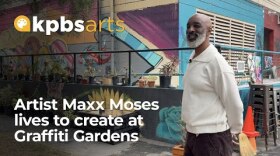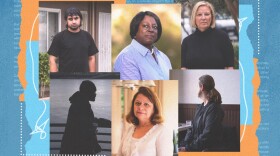San Diegans will be deciding next week whether the city should increase its sales tax. The debate has created odd political alliances and raised the question of which side is telling the truth.
There’s the Republican mayor stumping for a tax increase next to his one-time Democratic opponent who campaigned on the issue five years ago and lost. There are large business groups in favor of increasing the city’s sales tax rate, and debates over whether public-safety cuts are looming or are just a scare tactic. It’s all a part of the battle over whether San Diego should increase its sales tax rate.
Councilwoman Donna Frye is a leading supporter of the sales-tax increase, known as Proposition D. “It has to be a combination of budget cuts, reforms and new revenue in order for this to actually work and get to a balanced budget,” she said.
The tax increase would raise San Diego’s sales tax by a half-cent to 9.25 percent for a period of five years. That would generate more than $100 million a year for the city. But 10 reforms have to take place before the tax can be collected. Frye supported a similar plan when she ran for mayor in 2005 and it cost her the election. But Frye said it’s still the only way to solve the city’s structural budget deficit.
“You have cuts, you have reforms, you have revenue and those three things combined actually will solve the problem,” she said.
A recent report by the Citizens Fiscal Sustainability Task Force agrees with Frye’s assessment. The task force found Proposition D, coupled with three additional reforms, would permanently fix the city’s budget problems. That was enough to win over the Chamber of Commerce.
Proponents of the tax increase see the Chamber’s endorsement as a major coup and an example of the broad coalition of support behind Proposition D. But opponents counter that many smaller business groups oppose the measure.
Councilman Carl DeMaio is a leading Prop D critic. He said the measure’s reforms are vague and don’t promise any specific savings.
“There’s no guarantee that the reforms that we need, like managed competition, lasting pension reform, will be implemented,” he said. “And in fact, if you give city politicians an extra half a billion dollars in revenue, it actually will take the pressure of off fixing the city’s long standing financial problems.”
DeMaio and others often point out that several of the reforms are already happening. Look into outsourcing Miramar Landfill -- check; issue a Managed Competition Guide -- check; eliminate terminal leave -- check.
DeMaio questions whether the reforms will result in real savings for the city. But Mayor Jerry Sanders said DeMaio hasn’t offered another plan.
“Now that’s convenient. I wish I didn’t have to put out a plan before the election. That’d be the easiest thing in the world. Just trust me, I know what’s going on,” Sanders said. “I didn’t do that. I put out a plan. I’ve been very true to it. I’ve gone out in budget town halls and told people what the plan is.”
But DeMaio criticized those recent town halls. At the meetings department heads from fire, police, libraries, public works and park and rec outline what cuts their departments face if San Diego needs to cut $73 million from its budget next year. That’s the city’s projected deficit if Prop D doesn’t pass. DeMaio said the meetings are thinly veiled campaign rallies.
“You have budget town halls during October? We don’t do budget town halls until April every year,” he said. “But suddenly we have eight taxpayer-funded town halls throughout the entire city. Suddenly we have the police and fire chief in uniform on every morning show talking about doom and gloom.”
DeMaio calls such meetings scare tactics. But the mayor and other supporters say they’re just letting people know what might be coming. Councilman Todd Gloria said there’s no doubt public safety could be cut. Public safety expenses make up half the city’s general fund budget. Gloria said all you have to do is look at the fire department brownouts to know San Diego will cut public safety if it has too. And while critics say a higher sales tax will hit San Diego’s poor the hardest, Gloria said cuts to service would hurt them just as much.
“I live in City Heights, an area with a large concentration of gang activity. If we do not have our gang-suppression teams, what will happen? …If we don’t have our curfew sweeps every other Friday night, what will happen? We know what will happen, they know what will happen,” Gloria said. “We are trying to solve it with a reasonable and workable solution. They would rather wait until after Election Day to tell you that you can do without.”
Whether the city can do without the additional tax revenue remains up to the voters. And both sides are reaching out more as the election comes closer. Campaign ads from both sides are everywhere. Recent campaign filings show the pro on D side has raised about $452,000 while the opposition has raised abut $309, 000. Which investment will bring in enough returns at the ballot box will become clear on November 2nd.








